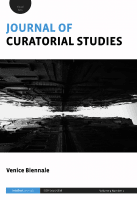
Journal of Curatorial Studies
Scope & Guideline
Charting New Territories in Visual Arts and Museology
Introduction
Aims and Scopes
- Curatorial Practices and Methodologies:
The journal emphasizes innovative curatorial methodologies, examining how curators conceptualize and execute exhibitions, often challenging traditional approaches to display and engagement. - Cultural and Political Contexts:
A consistent focus on the cultural and political dimensions of curating, exploring how exhibitions can reflect, critique, or impact societal issues, including decolonization, social justice, and community engagement. - Interdisciplinary Approaches:
The journal encourages interdisciplinary research that integrates perspectives from art history, sociology, anthropology, and technology, fostering a holistic understanding of curatorial practices. - Emerging Technologies in Curating:
A unique contribution of the journal is its exploration of the role of emerging technologies, such as AI and digital media, in reshaping curatorial practices and audience experiences. - Global Perspectives:
Highlighting global curatorial practices, the journal examines exhibitions and curatorial models from diverse cultural contexts, providing a platform for voices from underrepresented regions.
Trending and Emerging
- Curating for Social Change:
An increasing number of papers address the role of curating in fostering social change, emphasizing how exhibitions can engage with pressing societal issues, including activism, community representation, and political discourse. - Decolonization in Curatorial Practices:
There is a growing emphasis on decolonization within curatorial frameworks, with articles exploring how curators can challenge colonial narratives and promote diverse cultural perspectives in exhibitions. - Digital and Virtual Curating:
The rise of digital technologies has led to a significant focus on online and virtual curating, examining how digital platforms can enhance accessibility and redefine audience engagement in the art world. - Interdisciplinary Collaborations:
Emerging themes highlight collaborations across disciplines, such as art, science, and technology, showcasing innovative curatorial projects that integrate various fields and perspectives. - Environmental Concerns in Curating:
Recent publications increasingly address ecological issues, exploring how curatorial practices can respond to environmental crises and promote sustainability through art and exhibitions.
Declining or Waning
- Traditional Art Historical Approaches:
There has been a noticeable decrease in papers focusing solely on traditional art historical methods, indicating a shift towards more contemporary, interdisciplinary, and socially engaged curatorial practices. - Static Exhibition Models:
Papers discussing static exhibition models and traditional gallery formats are less frequent, suggesting a movement towards more dynamic and participatory approaches to curating. - Focus on Western Canon:
The journal has moved away from a predominant focus on the Western art canon, reflecting a broader commitment to inclusivity and a recognition of diverse narratives in the art world.
Similar Journals
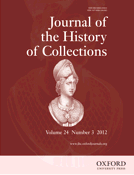
Journal of the History of Collections
Exploring the rich tapestry of collection histories.Journal of the History of Collections, published by Oxford University Press, serves as a vital resource for scholars and practitioners in the fields of conservation, museology, and visual arts. Established in 1989, this esteemed journal explores the intricate narratives of collections, addressing the historical, cultural, and social dynamics that influence collecting practices across various mediums. With an evolving publication span through 1994 and resuming in 1996 to the present day, the journal maintains a strong academic reputation, demonstrated by its impressive rankings in Scopus—placing it in the top quartiles for both Museology and Visual Arts and Performing Arts. Researchers and students will find engaging articles that not only contribute to academic discourse but also reflect on the conservation challenges faced by collections today. While currently not available as open access, the journal’s rigorous peer-review process ensures that only the highest quality research is published, making it an essential addition to any library dedicated to the arts and humanities.
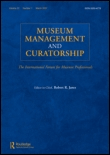
Museum Management and Curatorship
Shaping the Evolution of Museum ManagementMuseum Management and Curatorship is a leading academic journal dedicated to the exploration and advancement of museum practices, curatorial studies, and heritage management. Published by Routledge Journals, Taylor & Francis Ltd, this journal serves a diverse audience comprised of researchers, professionals, and students interested in the critical analysis of museum management strategies and the evolving role of curators in contemporary society. With its Q2 rankings in both Business and International Management and Tourism, Leisure and Hospitality Management, along with a prestigious Q1 classification in Visual Arts and Performing Arts, the journal underscores its importance in interdisciplinary research and showcases innovative practices within the sector. While operating under a subscription access model, it is committed to disseminating impactful findings and fostering a deeper understanding of museum dynamics from 1990 to the present, making it an essential resource in the field.

REVUE DES MUSEES DE FRANCE-REVUE DU LOUVRE
Preserving Culture, Inspiring PracticeREVUE DES MUSEES DE FRANCE-REVUE DU LOUVRE, published by CONSEIL MUSEES NATIONAUX, serves as a vital resource in the fields of Conservation, Museology, and the Visual Arts. With its ISSN 1962-4271 and a dedicated focus on the interplay between historical artifacts and contemporary museum practices, the journal has established itself within the academic community despite its Q4 ranking in various categories as of 2023. The journal is particularly aimed at researchers, professionals, and students who are engaged in the study of museum practices and the preservation of cultural heritage, providing insights and discussions that are both scholarly and practical. Though the journal does not have open access options, it remains a pivotal outlet for innovative ideas and critical perspectives from the vibrant French museum landscape. The issues published since its convergence years from 2009 to 2016 and from 2018 to 2024 continue to foster rich dialogues around the evolving role of museums in society, making it an essential read for anyone invested in the future of cultural institutions.

Laboratorio de Arte
Cultivating Academic Dialogue in the ArtsLaboratorio de Arte is an esteemed journal published by UNIV SEVILLA, EDITORIAL, specializing in the interdisciplinary fields of Arts and Humanities, Conservation, Museology, and Visual Arts. With an impactful presence in research since its inception, the journal has been open access since 2006, promoting the free dissemination of knowledge and fostering academic dialogue among scholars, professionals, and students. The journal adheres to rigorous academic standards, reflected in its categorization within the Q2 and Q3 quartiles across various disciplines, and its commendable rankings in Scopus make it an essential resource for those engaged in the arts. The h-index for this journal showcases its contribution to the field, further solidifying its importance in contemporary research. As it continues to evolve through 2023 and beyond, Laboratorio de Arte serves as a vital platform for innovative thoughts and practices within the vibrant landscape of artistic and cultural studies.

Rijksmuseum Bulletin
Unveiling the Stories Behind Masterpieces and ExhibitionsThe Rijksmuseum Bulletin, published by the Rijksmuseum Amsterdam, stands as a premier open-access journal in the realm of Visual Arts and Performing Arts, having transitioned to open access in 2012. With its ISSN 1877-8127, the journal is dedicated to exploring the rich tapestry of art history, exhibitions, and cultural discourse, supporting both scholarly research and the general appreciation of the arts. As a significant contributor within the Netherlands and beyond, the Bulletin garners a solid reputation, reflected in its current ranking in the Q3 category of Visual Arts and Performing Arts, with a Scopus rank of #510 out of 667. This engaging platform not only disseminates high-quality research but also fosters collaboration among researchers, professionals, and students, providing insights that highlight the importance of cultural heritage. With converged years spanning from 2011 to 2024, the Rijksmuseum Bulletin is poised to remain a vital source of knowledge within the arts community.
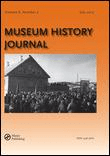
Museum History Journal
Unlocking the Secrets of Cultural Heritage and ConservationMuseum History Journal, published by Routledge Journals, a leading name in scholarly publishing under Taylor & Francis Ltd, serves as an essential platform for advancing knowledge in the fields of conservation, history, and museology. With its ISSN 1936-9816 and E-ISSN 1936-9824, the journal has established its presence in the United Kingdom and offers valuable insights from 2008 to 2024. Currently listed in the Q3 quartile for Conservation, History, and Museology categories, it ranks 677th in History and maintains a commendable percentile of 61% within the Arts and Humanities. Aimed at researchers, professionals, and students, the Museum History Journal strives to promote interdisciplinary dialogue and critical examination of museum practices, historical narratives, and conservation techniques, thereby contributing significantly to the academic discourse surrounding museums and cultural heritage. Access to this journal is crucial for those seeking to deepen their understanding of the evolving role of museums in society.

Arte Individuo y Sociedad
Transforming Artistic Exploration into Academic Excellence.Arte Individuo y Sociedad, published by UNIV COMPLUTENSE MADRID, SERVICIO PUBLICACIONES, is a leading Open Access journal dedicated to advancing understanding in the realms of Visual Arts and Performing Arts. With an impressive impact factor that places it in the Q1 category of its field and a remarkable Scopus rank of #92 out of 667, this journal stands as a vital resource for scholars, practitioners, and students alike. Since its inception in 1988, the journal has championed the dissemination of innovative research and critical discourse, fostering a platform where creativity and academia intersect. The converged years from 2010 to 2024 signify a dynamic evolution of the journal, reflecting contemporary issues and developments in visual and performing arts. For those interested in exploring the complex interplay between art and society, Arte Individuo y Sociedad offers essential insights and diverse perspectives in an increasingly interconnected global landscape.
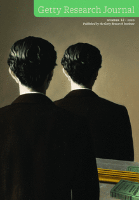
Getty Research Journal
Unveiling New Perspectives in Museology and the ArtsGetty Research Journal, published by University of Chicago Press, is an influential periodical in the fields of Conservation, History, Museology, and Visual Arts and Performing Arts. Established in the United States, this journal aims to foster scholarly discourse and advance research in the visual arts and cultural heritage, making it a vital resource for researchers, professionals, and students alike. While it holds a Q4 ranking across multiple disciplines in the 2023 category quartiles, indicating opportunities for growth and engagement, its unique focus on the interplay between art, history, and conservation provides a distinct platform for innovative ideas. The journal encompasses a diverse range of topics, encouraging interdisciplinary research that underscores the importance of the arts in society. As it converges years from 2015 to 2024, the Getty Research Journal serves not just as a publication, but as a dynamic forum for critical thought and exploration in the expansive realm of art and culture.

Religion and the Arts
Illuminating the Harmony Between Spirituality and the ArtsReligion and the Arts is a distinguished scholarly journal published by BRILL, based in the Netherlands, with a dedicated focus on the interdisciplinary exploration of religion and its interplay with various artistic expressions from historical and contemporary perspectives. Established in 1996, this journal serves as a vital platform for researchers, professionals, and students interested in Cultural Studies, History, Religious Studies, and the Visual and Performing Arts. Despite its current classification in the Q4 category across multiple fields, it remains committed to advancing academic discourse and fostering innovative approaches to understanding the complex relationships between spirituality and artistic creation. With its ISSN 1079-9265 and E-ISSN 1568-5292, the journal invites submissions that contribute to enriching this dynamic field, ensuring that a diverse range of voices and perspectives are represented. Although not an Open Access publication, the journal’s content continues to be pivotal for scholarly engagement and is essential reading for those dedicated to the study of art's profound connections with religious traditions.
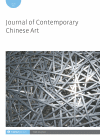
Journal of Contemporary Chinese Art
Catalyzing Conversations on Contemporary Art in ChinaThe Journal of Contemporary Chinese Art is a prestigious academic publication dedicated to advancing the discourse surrounding contemporary artworks and artistic practices in China. Published by INTELLECT LTD, this journal features insightful articles and research that catalyze discussions among scholars, practitioners, and students within the Visual Arts and Performing Arts fields. With an ISSN of 2051-7041 and an E-ISSN of 2051-705X, the journal operates without open access, yet remains a pivotal resource as reflected in its Q2 ranking in the 2023 category of Visual Arts and Performing Arts, positioning it within the 70th percentile on the Scopus Ranks. Covering a diverse range of topics from global influences on Chinese art to the socio-political dimensions of artistic expressions, the journal aims to foster a deeper understanding of contemporary cultural dynamics. Since its inception in 2019 and continuing through 2024, it has established itself as a critical platform for emerging voices and established experts alike, making it an essential read for anyone engaged in the study and appreciation of modern Chinese art.